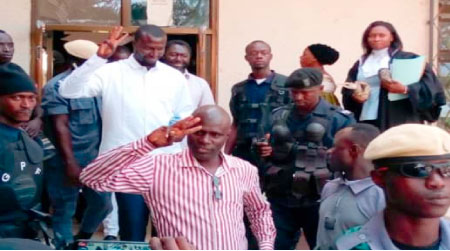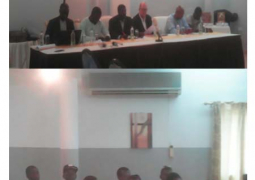
Justice
Amina Saho-Ceesay of the High Court in Banjul yesterday ruled that the defence
in the trial of the eight executive members of 3 Years Jotna Movement, have failed
to file an originating motion when they applied for bail on behalf of their
clients.
The
members which include: Abdou Njie, Ebrima Kitim Jarju, Sheriffo Sonko, Hagi
Sawaneh, Fanta Mballow, Karim Touray, Yankuba Darboe and Muctarr Ceesay, were
slammed with three charges of unlawful assembly, rioting after proclamation and
rioters demolishing structures.
In
her ruling, the presiding judge said that the lead prosecutor, P. Gomez, made
an application for adjournment on the grounds that they had just received the
file the day before and needed to review the file in order to file the
necessary processes.
This
application, she went on, was the subject of an objection by Defence Counsel R.
Mendy, who submitted that there was nothing before the court to warrant an
adjournment of the case and as such, she saw no purpose of the adjournment
except to continue denying the accused persons their liberties, and that until
such time when the state can properly come before the court, the accused
persons should be granted bail.
The
high court argued that whereas the accused persons have the right to liberty
pursuant to Section 19 of the Constitution subjects to certain restraints as
established by law, being guided by the constitutional provision of the
presumption of innocence.
She
maintained that being aware of the fact that the court has unfettered
discretion to grant bail using the time honoured principles and traditions that
have guided the courts and considering that it is imperative that in
determination of bail and its consequential matters, the court must be guided
by factors laid down in a deluge of cases including but not limited to the
following: the nature of the offence, the criminal record of the accused persons, the likelihood
of the accused persons jumping bail, the community ties and employment status
of the accused persons and immigration status if any, the possibility of
interfering with the investigation of the alleged offence, the possibility of
the accused committing another offence and the likelihood of keeping the peace.
“I
direct that this matter be heard by way of a formal application. In so
directing, I take into consideration that the application for bail before me
was made orally. In my view, the defence, as a consequence, have not brought to
the attention of the court the condition of the accused persons favourable to
the granting of bail. An application for bail, like any other application
before the court, deserves to be heard on the merits,” she told the court.
Justice
Saho-Ceesay went on to say that the presumption of innocence alone in her view,
does not make the grant of bail automatic since there is always the discretion
to refuse the grant of same if the court is satisfied that there are
substantial grounds for believing that the applicants for bail pending trial
would abscond or interfere with witnesses or otherwise obstruct the course of
justice.
“I
am also guided by the fact that when initiating an application for bail before
the High Court, the applicant must come by way of originating motion or
originating summons,” she added.
She
subsequently adjourned the case to 11 February, 2020, for hearing of bail for
the accused persons.



